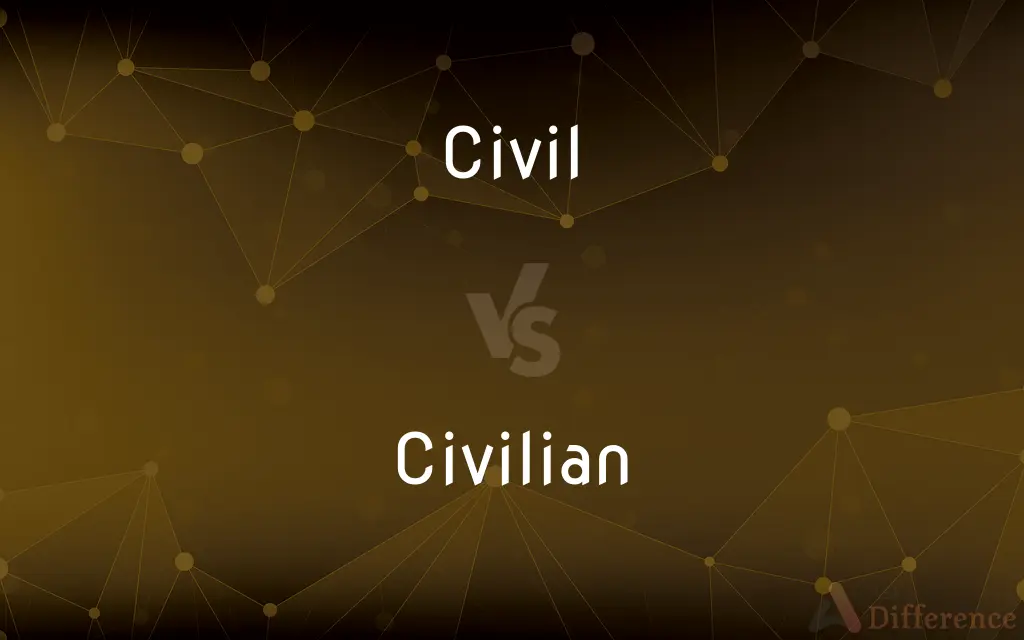Civil vs. Civilian — What's the Difference?
By Tayyaba Rehman — Updated on December 24, 2023
Civil relates to citizens or the state, often used in the context of legal and societal matters. Civilian specifically refers to a person who is not a member of the military or armed forces.

Difference Between Civil and Civilian
Table of Contents
ADVERTISEMENT
Key Differences
Civil pertains to citizens or the community, especially concerning legal, societal, or governmental matters. Civilian is a narrower term, used to distinguish individuals not engaged in military service or armed forces from those who are.
In the context of law, civil refers to non-criminal legal matters, involving disputes between individuals or organizations. Civilian is used to describe people not involved in the military, emphasizing their status outside of military structures.
Civil can also describe behavior that is courteous and polite, reflecting societal norms of respect. In contrast, civilian has no inherent implication of behavior but simply denotes a non-military status.
Civil is often used in compound forms, like civil rights, civil society, and civil engineering, each relating to aspects of citizenry and state. Civilian is typically used in a standalone context or in contrast to military or armed forces.
Civil encompasses a broad range of aspects related to public life, governance, and courtesy. Civilian, meanwhile, is specifically concerned with distinguishing individuals from military personnel.
ADVERTISEMENT
Comparison Chart
Definition
Pertaining to citizens, society, or courteous behavior
A person not in the military or armed forces
Context
Legal, societal, governmental
Military vs. non-military distinction
Behavioral Implication
Can imply politeness or courtesy
No inherent behavioral connotation
Common Uses
Civil law, civil rights, civil duties
Describing non-military persons
Focus
Broad, covering various aspects of public life
Specific to military status
Compare with Definitions
Civil
Relating to citizens and their relations with each other and the state.
Civil law deals with disputes between individuals.
Civilian
A person not in the armed services or police force.
The policy change affected both military personnel and civilians.
Civil
Connected to the community or public affairs.
She was active in civil society organizations.
Civilian
Involving non-combatants in a conflict.
The conflict caused numerous civilian casualties.
Civil
Relating to civil rights and freedoms.
The movement fought for civil liberties.
Civilian
Pertaining to civil life, not military.
After retirement, he adapted to civilian life.
Civil
Courteous and polite in behavior or manner.
Despite their disagreement, they remained civil.
Civilian
Relating to aspects of life outside of military institutions.
Civilian authorities took charge of the crisis.
Civil
Pertaining to non-criminal legal matters.
The civil court handles contract disputes.
Civilian
A person who is not an active member of the military, the police, or a belligerent group in a conflict.
Civil
Of or relating to citizens and their interrelations with one another or with the state
Government agencies concerned with civil affairs.
Civilian
Non-military in character or usage.
Civilian clothing differs from military uniforms.
Civil
Of, relating to, or befitting a citizen or citizens
Civil duties.
Civilian
In general use, a civilian is "a person who is not a member of the police, the armed forces, or a fire department." This use distinguishes from persons whose duties involve risking their lives to protect the public at large from hazardous situations such as terrorism, riots, conflagrations, and wars.Under international humanitarian law, civilians are "persons who are not members of the armed forces" and are not "combatants if they [don't] carry arms openly and respect the laws and customs of war". It is slightly different from a non-combatant, as some non-combatants are not civilians (for example, military chaplains attached to the belligerent party or military personnel serving with a neutral country).
Civil
Of ordinary citizens or ordinary community life as distinguished from the military or the ecclesiastical
Married in a civil ceremony at city hall.
Civilian
A person who is not an employee of the government
Programs available to both government employees and civilians.
Civil
Sufficiently observing or befitting accepted social usages; polite
A civil reply.
Civilian
A specialist in Roman or civil law.
Civil
Being in accordance with or denoting legally recognized divisions of time
A civil year.
Civilian
Of, relating to, or being a civilian or civilians
Civilian clothes.
A civilian career.
Civil
(Law) Relating to the rights of private individuals and legal proceedings concerning these rights as distinguished from criminal, military, or international regulations or proceedings.
Civilian
A person following the pursuits of civil life, especially one who is not an active member of the armed forces.
Three civilians were apprehended by the soldiers and taken away in a military vehicle.
Civil
(uncomparable) Having to do with people and government office as opposed to the military or religion.
She went into civil service because she wanted to help the people.
Civilian
(informal) A person who does not belong to a particular group or engage in a particular activity, an outsider.
The bathroom was for employees only, so civilians weren't allowed to use it.
Civil
(comparable) Behaving in a reasonable or polite manner.
It was very civil of him to stop the argument.
Civilian
One skilled in civil law.
Civil
(archaic) In a peaceful and well-ordered state.
Civilian
A student of civil law at a university or college.
Civil
(legal) Relating to private relations among citizens, as opposed to criminal matters.
A civil case
Civilian
Not related to the military, police or other governmental professions.
The three detainees were actually army defectors wearing civilian clothing.
He worked as a civilian journalist for ten years before being employed by the public broadcaster.
Civil
Secular.
Civilian
One skilled in the civil law.
Ancient civilians and writers upon government.
Civil
Pertaining to a city or state, or to a citizen in his relations to his fellow citizens or to the state; within the city or state.
Civilian
A student of the civil law at a university or college.
Civil
Subject to government; reduced to order; civilized; not barbarous; - said of the community.
England was very rude and barbarous; for it is but even the other day since England grew civil.
Civilian
One whose pursuits are those of civil life, not military or clerical.
Civil
Performing the duties of a citizen; obedient to government; - said of an individual.
Civil men come nearer the saints of God than others; they come within a step or two of heaven.
Civilian
A nonmilitary citizen
Civil
Having the manners of one dwelling in a city, as opposed to those of savages or rustics; polite; courteous; complaisant; affable.
Civilian
Associated with or performed by civilians as contrasted with the military;
Civilian clothing
Civilian life
Civil
Pertaining to civic life and affairs, in distinction from military, ecclesiastical, or official state.
Civil
Relating to rights and remedies sought by action or suit distinct from criminal proceedings.
Civil
Applying to ordinary citizens;
Civil law
Civil authorities
Civil
Not rude; marked by satisfactory (or especially minimal) adherence to social usages and sufficient but not noteworthy consideration for others;
Even if he didn't like them he should have been civil
Civil
Of or occurring within the state or between or among citizens of the state;
Civil affairs
Civil strife
Civil disobediece
Civil branches of government
Civil
Of or relating to or befitting citizens as individuals;
Civil rights
Civil liberty
Civic duties
Civic pride
Civil
(of divisions of time) legally recognized in ordinary affairs of life;
The civil calendar
A civil day begins at mean midnight
Civil
Of or in a condition of social order;
Civil peoples
Common Curiosities
Does "civil" cover criminal law?
No, civil law is distinct from criminal law.
Can "civil" refer to personal conduct?
Yes, it often implies politeness and respect in personal interactions.
Can a soldier be a civilian?
Only when they leave military service and return to civilian life.
Are "civil" matters always legal?
Not always; they can also pertain to public affairs or courtesy.
Is a police officer considered a civilian?
Typically, police are not considered civilians, as they are law enforcement.
Do civilians have military training?
Generally, civilians do not have military training.
Do civilians have a role in national defense?
Indirectly, through support roles and civilian governance.
Is "civil" behavior mandatory in society?
It's generally expected but not legally enforced.
Can "civil" be used to describe societal duties?
Yes, like in the term "civil responsibilities."
Can "civil" describe infrastructure?
Yes, like in "civil engineering."
Are all non-military people civilians?
Yes, anyone not in military service is considered a civilian.
Does "civil" relate to government matters?
Yes, especially in the context of citizenry and state.
Is "civil" used in international relations?
Yes, particularly in discussions about civil society and human rights.
Are there civilian roles in military areas?
Yes, such as administrative or support roles.
Can a civilian work in a military environment?
Yes, but they remain civilians unless enlisted in the military.
Share Your Discovery

Previous Comparison
Influenceable vs. Influence
Next Comparison
Arm vs. ForearmAuthor Spotlight
Written by
Tayyaba RehmanTayyaba Rehman is a distinguished writer, currently serving as a primary contributor to askdifference.com. As a researcher in semantics and etymology, Tayyaba's passion for the complexity of languages and their distinctions has found a perfect home on the platform. Tayyaba delves into the intricacies of language, distinguishing between commonly confused words and phrases, thereby providing clarity for readers worldwide.














































